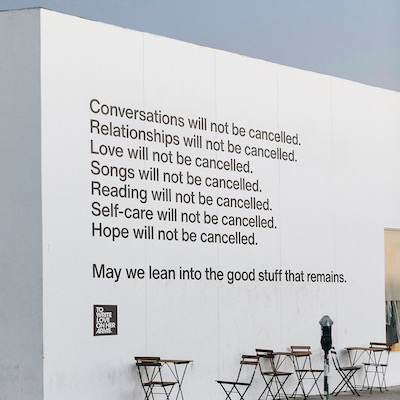Dante Morelli
My grandfather, Edward Valentino Morelli, was the closest person to me who experienced war. Only 17 years old, he stole his father’s identification to enlist at the local Army recruiting office. Two days later, his 15-year-old brother Nicholas “Popeye” Morelli did the same thing. (For many at the time, entrance into World War II was the only chance toward upward social mobility, and recruiters often looked the other way.) Many of us know someone who has served in a war and, for Americans, these military battles were in a distant land. We often tearfully wished soldiers “goodbye for now,” hoping and praying for their safe return. Now it feels to some like we’re again waging a battle, but this time it is a public health crisis and it is on American soil. It's on our turf, it's in our homes and it is massively disruptive. The coronavirus pandemic has forced us to change many aspects of our daily lives. From going to the grocery store to interacting with one another to teaching and supporting students, everything suddenly changed. Now we see stay-at-home orders for entire states across the nation. We must wait in line simply to enter our local grocery store. We wear protective gear in public. We are told to stay away from those who are ill in order to protect ourselves and others. We are seeing historic increases in unemployment claims. We see communal graves being dug to bury loved ones and refrigerated trucks holding the bodies of the deceased. We have had to change the way we mourn our loved ones when they die. We are learning new ways of living that could potentially be with us for some time. This pandemic is testing us in many ways—socially, medically, economically, professionally and personally—but I am more focused on our students and how this is testing their hopes and dreams for the future. I remember beginning my senior year of college when the tragedy of 9/11 brought our world to a stop. The days after 9/11 were filled with confusion, uncertainty and anxiety. I imagine our students are coping with similar feelings. As educators, we have an obligation to be there for our students during this challenge. They often look to us for answers in the work we assign, the tests we administer, the advice we share. Now, there is a shift in the answers they’re looking for. The responses we provide may not calm all of their anxiety, but as educators that we can listen to their concerns and help them to navigate the complexities of this human struggle. This is our teaching moment. Whether classroom faculty, counselors, librarians, PAs, specialists or coordinators, we all play a vital role in the success of our students—and even more so during a public health pandemic. During this crisis, Jamie Tworkowski, founder of a movement dedicated to finding hope and help for people struggling with depression, addiction, self-injury and suicide, reminds us of the humanity that we can provide to each other: Conversations will not be cancelled. Just as when our brave soldiers go off to fight wars, we are feeling besieged. Then, as now, the thing that gets us through is hope. Stay hopeful, and share your hope with our students. |
